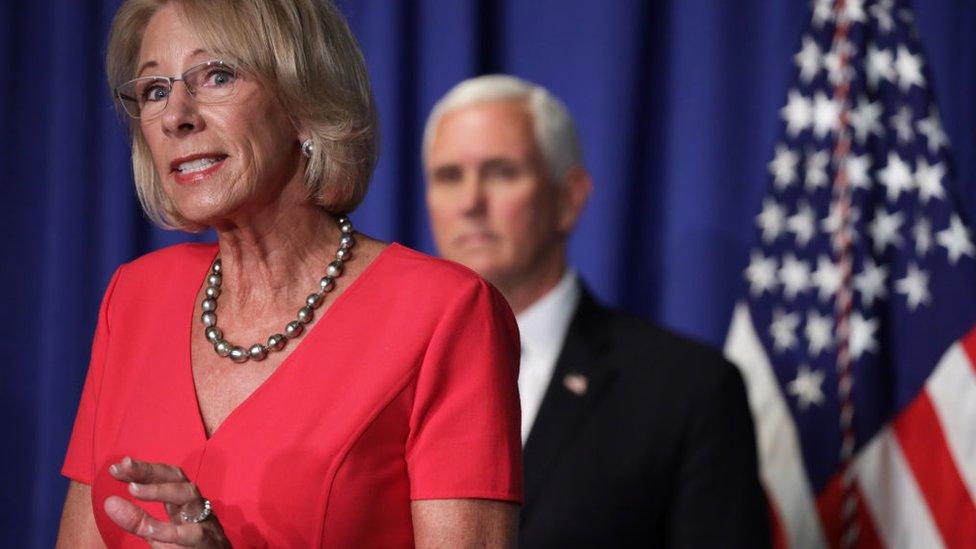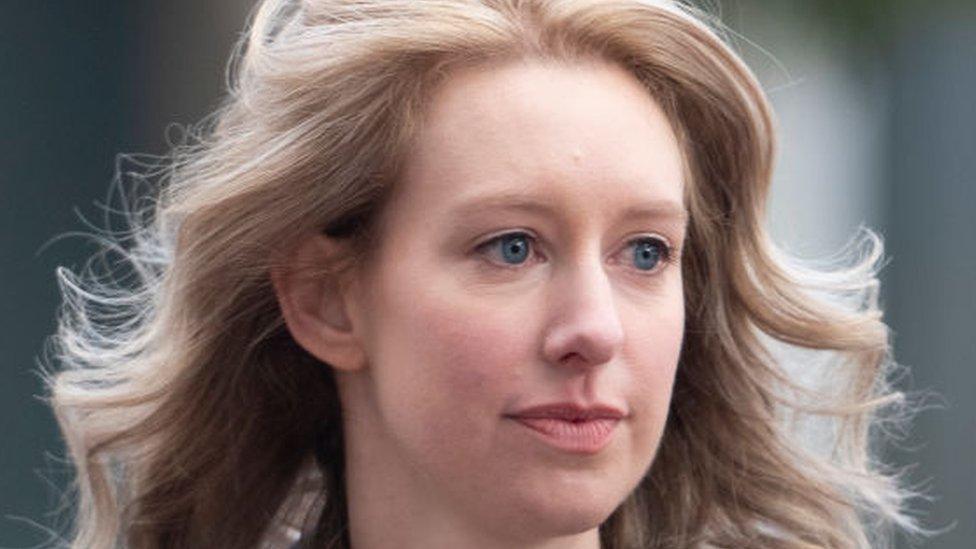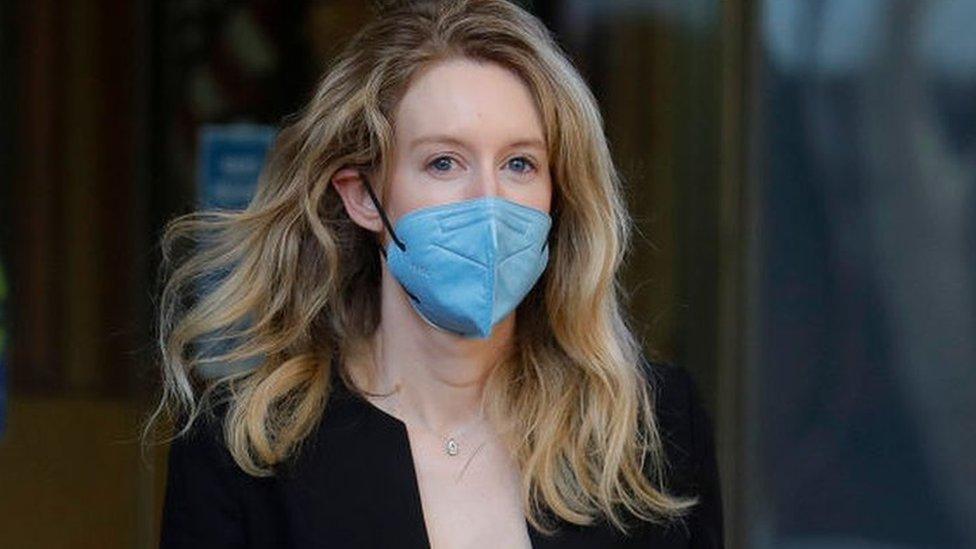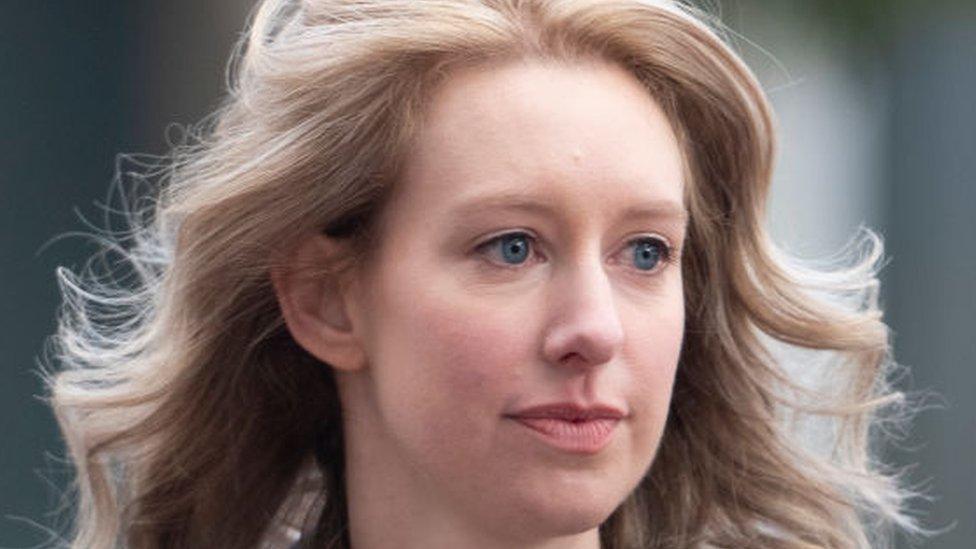Theranos: DeVos family 'misled' before investing $100m
- Published

Betsy DeVos was education secretary in the Trump administration
Investors managing funds on behalf of former US Education Secretary Betsy DeVos and her family were given false information relating to scandal-hit healthcare firm Theranos, her representative has said.
The DeVos family office invested $100m (£73m) in the now defunct company.
The claims were made at the trial of Theranos founder Elizabeth Holmes.
Ms Holmes is accused of lying to investors and patients about the company's blood-testing technology.
Ms Devos family's investment arm is one of several high profile investors allegedly duped by the firm.
Ms Holmes, 37, denies the claims.
The former Silicon Valley star is charged with 12 counts of fraud and could face 20 years in jail if found guilty.
The Devos family is one of America's richest, and Betsy Devos, a Republican, served as education secretary under Donald Trump.
Lisa Peterson, a representative of the DeVos family's investment office, told the San Jose court on Tuesday that she had been asked to explore a potential investment in Theranos in 2014.

Elizabeth Homes is charged with fraud
She said the firm had provided her with detailed information, including that its tests were used by the US military and big pharmaceutical companies.
The firm also allegedly said that its devices could conduct 300 blood tests before having to be replaced, and that the company did all of its testing on its own lab machines, not third party equipment.
According to the US Attorney's Office, which is prosecuting Ms Holmes, those claims were false and were deployed to fraudulently raise $700m from powerful investors.
Ms Peterson told the court that the DeVos family had originally intended to invest $50m in Theranos, but doubled the amount after meeting Ms Holmes, who convinced them the technology was a "game changer for healthcare".
Ms Holmes' defence lawyer, Lance Wade, suggested the DeVos family had not done proper due diligence, to which Ms Peterson replied: "We didn't think we needed it."
Mr Holmes' trial began in September and is likely to last until December. The trial so far has also heard:
Ms Holmes allegedly faked "independent due diligence reports" from pharmaceutical companies Pfizer and Schering-Plough, which backed the viability of her technology
Wade Miquelon, the former chief financial officer of pharmacy chain Walgreens, testified that the company was impressed by this research and went on to partner with Theranos and invest $140m
Former Safeway boss Steve Burd said his company spent 100 hours doing due diligence on Theranos before agreeing to a partnership deal in 2010
Sunil Dhawan, who served as Theranos' lab director in 2014-2015, testified that he had only been to the firm's labs a handful of times and rarely interacted with its technicians.
Once dubbed the "next Steve Jobs", Ms Holmes rose to fame in 2013 thanks to technology she claimed could test for multiple diseases using just a few drops of blood from a finger prick.
But in 2015 a whistleblower revealed the tests did not work, and the billionaire inventor fell from grace.
In 2016 she was banned from running a blood testing firm for two years, and by 2018 Theranos had been dissolved. Ms Holmes and Ramesh "Sunny" Balwani - her former business partner and boyfriend - were charged with fraud shortly after that.
'She is innocent'
Ms Holmes' lawyers say she did not intend to defraud, but instead "naively underestimated" the challenges her business faced.
They also allege Mr Balwani abused her emotionally and psychologically for years, impairing her mental state. Mr Balwani denies the allegations.
At the start of the trial in September, Mr Wade said: "By the time this trial is over, you will see that the villain the government just presented is actually a living, breathing human being who did her very best each and every day. And she is innocent."
Related topics
- Published23 September 2021

- Published19 November 2022
